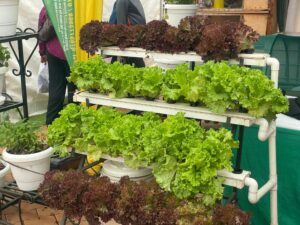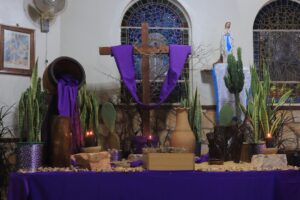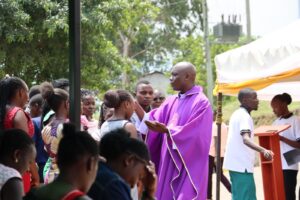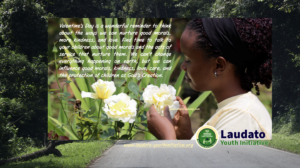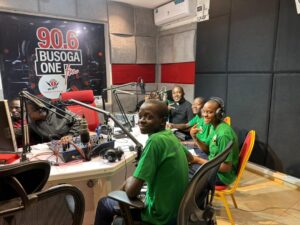By Fred Ayebale | Laudato Youth Initiative Media | September 29, 2025.
The Laudato Youth Initiative is continually reaffirmed by field findings showing that indigenous communities, through generations of ecological knowledge and committed practices, are key partners in preserving forests, maintaining watershed health, and protecting biodiversity. A pilgrimage undertaken by Laudato Youth – Laudato Si Club of Nyakasura school in western Uganda confirms that grassroots communities around Karangura Hills and the Mt. Rwenzori region are making measurable contributions to ecosystem conservation especially for the River Mpanga catchment, which originates in the Rwenzori Mountains.

The Karangura Hills, Mt. Rwenzori, and River Mpanga
River Mpanga rises in the Rwenzori Mountains in Kabarole District and flows through several districts including Kamwenge, Kyenjojo, and Kitagwenda, before reaching Lake George. This river is an essential water source for irrigation, domestic use, hydropower, and livelihoods for hundreds of thousands of people (Daily Monitor, 2024).
The Karangura Hills, located in the Rwenzori foothills, are inhabited by the Bakonzo people, who have traditionally lived in close harmony with nature. Their practices such as rotational harvesting, sacred forest preservation, and seasonal land use have helped protect the rich biodiversity and water systems of the area (Rwenzori.org, n.d.).
The Rwenzori Mountain tropical rainforest, a UNESCO World Heritage site, is known for its ecological significance, serving as a water catchment area and biodiversity hotspot. The spiritual and cultural connections that indigenous people have with the land contribute to sustainable practices embedded in local life (Rwenzori Mountains National Park, n.d.).

Our Key Findings agree with other researchers that Indigenous Contributions and Practice are a lead contributor in;
1. Forest Protection Through Community Forests
The Ruboni Community Forest Project, run by the Rwenzori Community Conservation and Development Project (RCCDP), is a model for community-managed forest protection. Local communities practice sustainable harvesting, forest patrols, and indigenous tree replanting to preserve biodiversity and reduce pressure on Rwenzori Mountains National Park (Rwenzori.org, n.d.).
These forests act as ecological buffers and carbon sinks, and also support climate resilience by protecting soil and regulating temperature and rainfall patterns (Animal View Safaris, n.d.).
2. Watershed Management and Riverbank Restoration
Communities in the Karangura area along the Mpanga catchment have implemented riverbank rehabilitation activities to combat erosion and water pollution. These include replacing exotic tree species (like eucalyptus) with indigenous varieties, promoting agroforestry, and engaging in community-led river protection campaigns (IRC, 2021).
These efforts directly benefit the River Mpanga’s health, ensuring continued water supply to key towns like Fort Portal and maintaining ecological balance across the region (Daily Monitor, 2024).
3. Cultural Conservation and Traditional Norms
The Bakonzo consider the Rwenzori Mountains sacred and protect specific zones as “spiritual forests.” These zones are traditionally off-limits to logging and farming. Local taboos, rituals, and knowledge systems act as conservation tools, preserving species diversity and reducing deforestation (Rwenzori Mountains National Park, n.d.).

4. Livelihoods Aligned with Conservation
The Karangura and Ruboni communities have built eco-tourism initiatives that provide income while protecting natural ecosystems. Activities such as forest hikes, cultural walks, and homestays provide sustainable income alternatives to logging or charcoal burning (Kitara RCC, 2024).
Additionally, local cooperatives engage in beekeeping, herbal medicine cultivation, and crafting using non-timber forest products, reducing reliance on extractive practices (Rwenzori.org, n.d.).
We also Identified Challenges and which other researchers too identified
Despite these successes, communities still face challenges such as:
• Encroachment and riverbank farming, especially along the Mpanga River, continue to degrade the ecosystem (IRC, 2021).
• Limited funding and capacity for scaling indigenous conservation projects.
• Climate change impacts such as glacier retreat in the Rwenzoris, affecting perennial water sources and seasonal rainfall (Water Journalists Africa, 2023).

Implications for Laudato Youth Initiative and Recommendations
Findings from this Green Walk involving Laudato Youth affirm that engaging and supporting indigenous communities is essential to fulfilling the ecological vision of Laudato Si’. Key recommendations would include:
1. Training youth in indigenous ecological knowledge through mentorship and intergenerational learning.
2. Expanding native species reforestation and agroforestry initiatives in Mpanga and Karangura.
3. Promoting sustainable ecotourism and linking it with conservation funding.
4. Building capacity in watershed governance by involving youth, women, and elders in catchment management committees.

As an intiative that values indegenous knowledge we believe Indigenous communities in Karangura and the greater Mt. Rwenzori region are living embodiments of Pope Francis’ call to integral ecology. Their time-tested wisdom, combined with grassroots conservation, offers a blueprint for forest and watershed restoration. For the Laudato Youth Initiative, these findings are not just inspiration they are a call to action to continue amplifying and supporting these local efforts for the good of our common home.

References
Animal View Safaris. (n.d.). Rwenzori Mountains Conservation – Community involvement in protecting the park. Retrieved from https://www.animalviewsafaris.com/rwenzori-mountains-conservation/
Daily Monitor. (2024). Govt to regulate water use on River Mpanga. Retrieved from https://www.monitor.co.ug/uganda/news/national/govt-to-regulate-water-use-on-river-mpanga-4964504
IRC. (2021). Rehabilitating River Mpanga in Uganda. IRC WASH. Retrieved from https://www.ircwash.org/news/rehabilitating-river-mpanga-uganda
Kitara RCC. (2024). Fascinating Bwamba Pass Trail of Karangura Community in the Rwenzori Mountains. Retrieved from https://kitararcc.com/2024/02/12/fascinating-bwamba-pass-trail-of-karangura-community-in-the-rwenzori-mountains/
Rwenzori.org. (n.d.). Community-based Conservation Programs. Retrieved from https://www.rwenzori.org/conservation/
Rwenzori Mountains National Park. (n.d.). The People of Rwenzori. Retrieved from https://www.rwenzorimountainsnationalpark.com/the-people-of-rwenzori/
Water Journalists Africa. (2023). Vanishing Glaciers: Climate Change Impacts Culture, Livelihoods, and Health in Western Uganda. Retrieved from https://waterjournalistsafrica.com/2023/10/vanishing-glaciers-climate-change-impacts-culture-livelihoods-and-health-in-western-uganda










